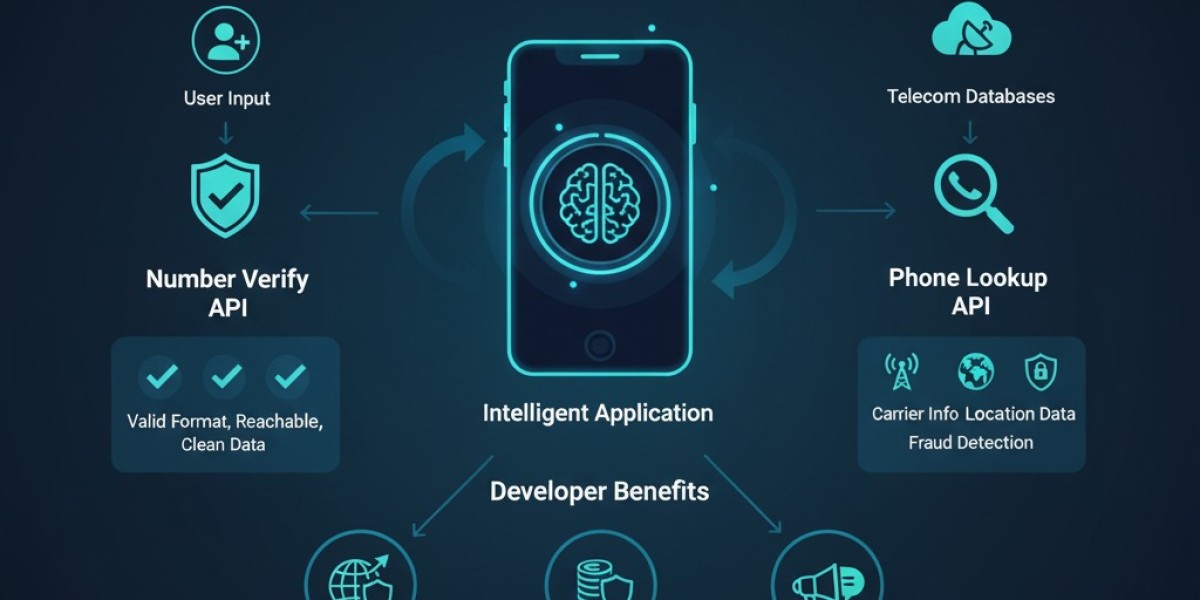Real-time communication and data-driven applications, phone number intelligence has become a cornerstone of modern development. Whether you're building a fintech platform, a CRM system, or a global e-commerce solution, integrating tools like an API number lookup and a carrier lookup API can significantly improve your application's reliability, security, and user experience.
This article offers a comprehensive overview of these APIs, their importance, benefits, and practical applications for developers. We’ll explore how they work, how to integrate them, and how they can help you build smarter, more secure systems.
Why Phone Number Intelligence Matters
Phone numbers are more than just contact details they’re unique identifiers used for authentication, communication, and personalization. For developers, ensuring that phone numbers are valid, reachable, and enriched with carrier-level metadata is essential for:
Preventing fraud
Improving message deliverability
Enhancing user onboarding
Supporting compliance with data regulations
An API number lookup validates and formats phone numbers, while a carrier lookup API provides metadata such as carrier name, network type, and ported status. Together, they form a powerful toolkit for building secure and scalable applications.
What Is API Number Lookup?
An API number lookup is a service that allows developers to programmatically validate phone numbers. It checks whether a number is:
Properly formatted (E.164, national, international)
Valid and active
Associated with a known line type (mobile, landline, VoIP)
Located in a specific country or region
Example Request:
GET https://api.numverify.com/validate?access_key=YOUR_API_KEY&number=+14158586273
Example Response:
{
"valid": true,
"number": "+14158586273",
"local_format": "4158586273",
"international_format": "+14158586273",
"country": "United States",
"location": "San Francisco",
"carrier": "AT&T",
"line_type": "mobile"
}
This data can be used to validate user input, enrich customer profiles, and trigger conditional logic in your application.
What Is Carrier Lookup API?
A carrier lookup API retrieves metadata about a phone number by querying telecom databases. It returns:
Carrier name (e.g., Verizon, Vodafone)
Network type (GSM, CDMA, LTE)
Ported status (has the number changed carriers?)
Risk indicators (spam or fraud potential)
This information is especially useful for fraud detection, lead scoring, and optimizing communication workflows.
Benefits for Developers
Integrating API number lookup and carrier lookup API offers several advantages:
✅ Improved Data Accuracy
Catch invalid or mistyped numbers before they enter your system.
✅ Enhanced User Experience
Ensure smoother onboarding and communication flows.
✅ Fraud Prevention
Identify suspicious or high-risk numbers in real time.
✅ Smarter Segmentation
Use carrier and location data to personalize outreach.
✅ Global Compatibility
Support international formats and carriers effortlessly.
Integration Best Practices
To get the most out of these APIs, developers should follow a few key practices:
1. Validate Early
Integrate number validation at the point of data entry (e.g., signup forms).
2. Cache Responses
Reduce API calls by caching validated numbers and carrier data.
3. Handle Errors Gracefully
Implement fallback logic for unreachable or invalid numbers.
4. Monitor Usage
Track API usage to stay within provider quotas and optimize performance.
5. Secure API Keys
Store credentials securely and rotate them periodically.
Use Cases Across Industries
?️ E-Commerce
Validate customer numbers during checkout to reduce delivery errors and enable SMS order updates.
? Fintech
Prevent fraud by validating phone numbers during account creation, KYC, and transaction verification.
? Healthcare
Ensure accurate patient contact information for appointment reminders and telehealth services.
? Call Centers
Use carrier lookup API to identify caller details and route calls more efficiently.
? Marketing Automation
Segment leads based on carrier, location, or line type to improve targeting and ROI.
Security Considerations
Handling phone number data requires careful attention to privacy and compliance. Here’s how developers can protect user data:
Use HTTPS: Encrypt all API requests and responses.
Minimize Data Storage: Store only necessary fields and avoid retaining sensitive metadata.
Comply with Regulations: Follow GDPR, TCPA, and other relevant data protection laws.
Audit Access Logs: Monitor who accesses phone data and when.
Obtain Consent: Ensure users agree to phone number usage for verification or communication.
Security isn’t just about protecting data, it’s about building trust with your users.
Comparing Verification Services
When choosing an API number lookup or carrier lookup API, consider the following factors:
Feature | Numverify | Twilio | Nexmo | Telesign |
Global Coverage | ✅ | ✅ | ✅ | ✅ |
Carrier Lookup | ✅ | ✅ | ✅ | ✅ |
Line Type Detection | ✅ | ✅ | ✅ | ✅ |
Real-Time Validation | ✅ | ✅ | ✅ | ✅ |
Free Tier Availability | ✅ | Limited | Limited | Limited |
Developer Documentation | ✅ | ✅ | ✅ | ✅ |
Numverify stands out for its simplicity, affordability, and ease of integration—ideal for small teams and startups.
Future Trends in Phone Number Verification
As communication channels evolve, so do the tools that support them. Here are a few trends shaping the future:
AI-Powered Risk Scoring: Predict fraud likelihood based on behavioral patterns.
Multimodal Verification: Combine phone, email, and biometric data for stronger authentication.
Real-Time Portability Checks: Detect carrier changes instantly to maintain message deliverability.
Privacy-First APIs: Offer verification without exposing sensitive metadata.
Developers who stay ahead of these trends will be better equipped to build secure, scalable, and user-friendly applications.
FAQs
Q1: What is API number lookup, and how does it work?
API number lookup validates and formats phone numbers in real time. It checks for correct formatting, line type, and reachability using telecom databases.
Q2: Why is carrier lookup important for developers?
Carrier lookup provides metadata like carrier name, network type, and ported status. This helps optimize routing, detect fraud, and personalize communication.
Q3: How do I choose the right API for my project?
Consider global coverage, response speed, data depth, pricing, and ease of integration. Look for APIs with clear documentation and flexible plans.
Q4: What are the security risks associated with phone number verification?
Risks include data leaks, unauthorized access, and non-compliance. Mitigate them by using HTTPS, securing API keys, minimizing data storage, and following privacy laws.
Q5: Can these APIs be used in real-time applications?
Yes. Both APIs are designed for real-time use cases like onboarding, verification, and communication workflows.
Smarter Data, Smarter Apps
For developers building modern, data-driven applications, integrating an API number lookup and a carrier lookup API is a strategic move. These tools not only improve data quality but also enhance security, personalization, and global scalability.
Whether you're validating user inputs, enriching CRM records, or optimizing communication flows, these APIs offer the flexibility and reliability needed to build smarter systems.








